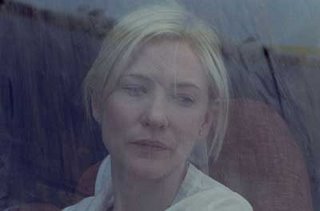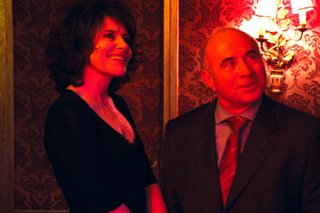 It's been a kind of Cate Blanchett year for me. In March, I had a chance to see her play Hedda Gabler in the Sydney theatre company production that was remounted at the Brooklyn Academy of Music (see post far below). She's an actress I hugely admire, like others I've already talked about, principally Juliette Binoche. In many ways Binoche and Blanchett are kind of spiritual opposites. Cate is all about the inner struggle being held back at the face with rigid control. Whereas Juliette is all about that unstoppable inner luminescence, which the face acts as the channeler of. Everything is always hidden on Blanchett's face. And there is nothing that can be hidden with Binoche. There is great beauty in both.
It's been a kind of Cate Blanchett year for me. In March, I had a chance to see her play Hedda Gabler in the Sydney theatre company production that was remounted at the Brooklyn Academy of Music (see post far below). She's an actress I hugely admire, like others I've already talked about, principally Juliette Binoche. In many ways Binoche and Blanchett are kind of spiritual opposites. Cate is all about the inner struggle being held back at the face with rigid control. Whereas Juliette is all about that unstoppable inner luminescence, which the face acts as the channeler of. Everything is always hidden on Blanchett's face. And there is nothing that can be hidden with Binoche. There is great beauty in both.Babel is one of those movies that makes you want to run to the people you love and tell them how much. It is the third in the brilliant Alejandro Gonzalez Inarittu's trilogy that began with Amores Perros and 21 Grams. In Babel, Inarittu is moving into loftier ground, as he brings together his extraordinary passionate response to the world with a rarefied and fully formed cinematic sensibility. He is like the faces of both actresses (but Binoche has nothing to do with Babel): keeping tight reins on all it contains but sometimes exploding with irresistible force.
 Three storylines converge in unexpected ways and each is harrowing. Cate Blanchett and Brad Pitt are a couple travelling in Morocco on the downslope of a marriage impacted by the recent loss of a child. Meanwhile, their two other children are being cared for in their absence by a nanny (the sublime Adriana Barraza) whose son is getting married in Mexico. Incongruously, in Japan we find a young teenaged woman, oversexed and underloved, struggling to make sense of the range of her feelings (played by an astonishing Rinko Kikuchi). The three storylines quickly unravel simultaneously: two boys playing with a rifle pick off Blanchett by accident in the tour bus, triggering an international incident. The children's nanny takes the children to the wedding in Mexico, then allows her drunk son-in-law to take them back, leading to near capture police and abandonment in the desert. The young Japanese girl's mother has committed suicide and meanwhile her father is perhaps the hunter who gave the two Arab boys' father their gun. Complexity interweaves, but not just at the narrative level. We both like and dislike the characters and their decisions and their situations are uncommonly hard to judge.
Three storylines converge in unexpected ways and each is harrowing. Cate Blanchett and Brad Pitt are a couple travelling in Morocco on the downslope of a marriage impacted by the recent loss of a child. Meanwhile, their two other children are being cared for in their absence by a nanny (the sublime Adriana Barraza) whose son is getting married in Mexico. Incongruously, in Japan we find a young teenaged woman, oversexed and underloved, struggling to make sense of the range of her feelings (played by an astonishing Rinko Kikuchi). The three storylines quickly unravel simultaneously: two boys playing with a rifle pick off Blanchett by accident in the tour bus, triggering an international incident. The children's nanny takes the children to the wedding in Mexico, then allows her drunk son-in-law to take them back, leading to near capture police and abandonment in the desert. The young Japanese girl's mother has committed suicide and meanwhile her father is perhaps the hunter who gave the two Arab boys' father their gun. Complexity interweaves, but not just at the narrative level. We both like and dislike the characters and their decisions and their situations are uncommonly hard to judge. As the movie plunged towards its spiralling disasters in each scenario, I found myself clutching the arms of my seat, the way you do on the downslide of a rollercoaster. What fails all the people in all the stories is what gives the movie it's genius: they are unable to communicate in a way that describes what they need or feel. They say the same things over and over but no one is able to really hear them. Selfishness and politics are rampant. The immediate response of the human condition is to gauge one's own need, most visibly described by the way in which the other tourists on their bus band together to abandon the injured couple. There is no jumping off the hook, though the movie moves gently for a redemptive ending.
The Inarittu style is becoming formalized in a breathtaking way. His use of static and moving images to convey the emotional line of his films is at a staggering level of clarity now. It also all about editing style - where to hold the image, where to allow rapid formation. The Japanese sequences are probably the most skilled, the most stunning in contrasts. When Cheiko goes to a nightclub, her deaf experience is modeled for us by switching back and forth from full throbbing basebeats to nothing but a sense of vibration given by light and movement. It's amazing. The use of sound and visual editing is highly expressive throughout: intense noises are bookended: from a scream in one part of the world to silence in another. We watcha a chicken's head being cut off in Mexico and cut to blood pouring out of Blanchett's head in Morocco. The result is a constant sense of danger, even in the midst of the greatest happiness. We know something will happen. We just don't know when. Or where.
Incredible then, to go from this apocalyptic vision to the tray of bonbons that is Paris, Je T'aime. Twenty international directors offer twenty different views of romantic Paris. About 6 or 7 minutes each, they are little madeleines of mostly delicious experience. Many of them you long to have built into narrative sequences. Some are good riddance. It truly is a chocolate box experience - you know right away: like pushing in the bottoms to see what the filing is, the first minute offers the flavour on view. Taste becomes extreme - if you don't like pralines and cream, you really really don't like them. And you reject them with energy. That's how I experienced these shorts. But there were only three real rejections. The rest I happily gobbled up.
 I will mention what were for me, are the five most memorable. The increasingly exciting Nobuhiro Suwa, whose gorgeous Un Couple Parfait in last year's festival has haunted me for a year, offers what I think is the best short and the one that includes Binoche. (Okay. All right. I'm not exactly objective!) A woman recovering from the death of her son, (which is also Blanchett's challenge in Babel), she follows his voice into the street late at night and has a surreal encounter with him and Wilhelm Defoe as a cowboy. The brief encounter is enough to reassure her and we have one of those transcendent moments of understanding in a close shot at the end that only Binoche can create.
I will mention what were for me, are the five most memorable. The increasingly exciting Nobuhiro Suwa, whose gorgeous Un Couple Parfait in last year's festival has haunted me for a year, offers what I think is the best short and the one that includes Binoche. (Okay. All right. I'm not exactly objective!) A woman recovering from the death of her son, (which is also Blanchett's challenge in Babel), she follows his voice into the street late at night and has a surreal encounter with him and Wilhelm Defoe as a cowboy. The brief encounter is enough to reassure her and we have one of those transcendent moments of understanding in a close shot at the end that only Binoche can create.  I liked next Richard LaGravanese's sweetly ironic take on a middle-aged/senior couple trying to refind the spice in their marriage. Fanny Ardant and Bob Hoskins meet up in a strip club for a private show but cannot fulfill the roles they've given for each other. The tawdriness of the club is contrasted with a three piece band in the street playing their favourite song. It is only in this context that they can really find and understand what they have become. Fanny Ardant is luminous in any role, but it's especially nice to see her smile and play and use the more subtle range of her tremendous craft. In recent roles, she has been forced to be more hard-edged. Hoskins is a perfect foil: both caring and sweet and also a man, looking to feel like one.
I liked next Richard LaGravanese's sweetly ironic take on a middle-aged/senior couple trying to refind the spice in their marriage. Fanny Ardant and Bob Hoskins meet up in a strip club for a private show but cannot fulfill the roles they've given for each other. The tawdriness of the club is contrasted with a three piece band in the street playing their favourite song. It is only in this context that they can really find and understand what they have become. Fanny Ardant is luminous in any role, but it's especially nice to see her smile and play and use the more subtle range of her tremendous craft. In recent roles, she has been forced to be more hard-edged. Hoskins is a perfect foil: both caring and sweet and also a man, looking to feel like one.I love Tom Tykwer. His energetic narrative style in Run Lola, Run was the precursor to the Amelie stylings of contemporary European filmmakers. In his segment, Natalie Portman plays the actress girlfriend to a young blind boy who is never sure if she is acting or truthful in her role as his girlfriend. The signature Tykwer camera style - electric and provocative works well here to both tell story and then stop on a dime of the blind character's experience with precision and charming nuance.
The first two shorts are my last two favourites. In the opening one, directed by Bruno Podalydes, a man struggles to parallel park in a parking space but once there, laments that his life is empty and meaningless. Stepping out, he sees that a woman has collapsed right beside him on the sidewalk. Moving her to his backseat, he suddenly has meaning in his life and the surprise is as perplexing as the previous life was. By the end, his doubt is slowly eroded and he is willing to submit. Ironic and cheerful at once, it was a great way to start.
It was followed by Gurinder Chadha (Bend It Like Beckham's story about a young Parisian lad who falls for a Muslim girl on the Quai des Seines. Following her, he discovers that her headscarf is not a signal of obedience and restriction, but an expression of her identity as a woman, and a smart woman to boot. The segment ends with the woman's father escorting the couple down a street and telling the young man that she will one day write about the Paris of her own experience: a Muslim Paris.
And so the world has been returned to an Arab focus where, in Morocco, we are ready for the story of Babel to begin. In that movie, people are unable to speak from the damage of failed love. In Paris, Je T'aime, people speak in the language of love in the city of love. Romantic?, yes. Idealistic?, I guess. The movies?, of course!
No comments:
Post a Comment